| Srl | Item |
| 1 |
ID:
089325
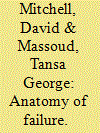

|
|
|
|
|
| Publication |
2009.
|
| Summary/Abstract |
The Bush administration's decision-making process leading to the invasion of Iraq in 2003 has been singled out for its many shortcomings: failure of intelligence; lack of debate concerning options; an insufficient invading force; and poor postwar planning. Contrary to the administration's claim that no one foresaw the difficulties of waging a war in Iraq, many concerns about the challenges the United States would face were raised inside and outside of government. Yet, none of this information had a significant effect on the decision-making process. This paper develops a decision-making model that integrates elements from the individual to the organizational level and explains how important information was marginalized, leading to a poor policy outcome. The model illustrates how the combined effects of the president's formal management style, anticipatory compliance on the part of key players, bureaucratic politics, and the intervening variable of the 9/11 terrorist attacks contributed to a defective decision-making process.
|
|
|
|
|
|
|
|
|
|
|
|
|
|
|
|
| 2 |
ID:
065290
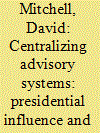

|
|
|
| 3 |
ID:
178178
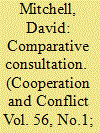

|
|
|
|
|
| Summary/Abstract |
Exchanges of expertise and experience between personnel involved in different peace processes are now a common feature of peacemaking worldwide. However, the goals, methods and impact of such interactions have been subject to little research. This article is the first scholarly analysis of what is here called ‘comparative consultation’. The article begins by conceptualising this work as a unique form of Track Two unofficial diplomacy, sharing the practical format and theoretical grounding of other Track Two approaches but differing in content. The empirical section is based on semi-structured interviews with 16 practitioners – primarily conflict resolution non-governmental organisation personnel and academics – who have facilitated dialogues on peace process topics (such as negotiation, transitional justice, grassroots peacebuilding) between peace process actors at various levels and from many contexts. It also draws on the author’s participation in a series of comparative consultation events. The findings focus on aspects of the organisation, purpose and potential, and limitations and possible risks of the practice. The conclusion sets out a model of the dimensions and potential impacts of comparative consultation and argues for its recognition as a distinct peace methodology. Avenues for further research and practice are outlined.
|
|
|
|
|
|
|
|
|
|
|
|
|
|
|
|
| 4 |
ID:
080326
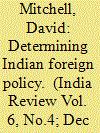

|
|
|
| 5 |
ID:
062517
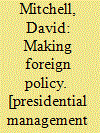

|
|
|
|
|
| Publication |
Aldershot, Ashgate Publishing, 2005.
|
| Description |
ix, 271p.
|
| Standard Number |
0754644634
|
|
|
|
|
|
|
|
|
|
|
|
Copies: C:1/I:0,R:0,Q:0
Circulation
| Accession# | Call# | Current Location | Status | Policy | Location |
| 049723 | 327.73/MIT 049723 | Main | On Shelf | General | |
|
|
|
|
| 6 |
ID:
181319
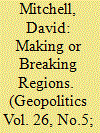

|
|
|
|
|
| Summary/Abstract |
China’s Belt and Road Initiative (BRI) has gained worldwide attention, as the government of Xi Jinping has committed itself to globe the spanning connectivity project. Global in scope, the role of regions and regional organisations has been identified as being important elements in bringing the BRI to fruition, even though its execution has been based on bilateral agreements. This is true in those regions, notably South Asia, Southeast Asia and the Indian Ocean that are central to the BRI’s immediate development and early recipients of substantial investment. This raises the question of what type of influence the BRI will have on these regional groupings. Drawing on the concept of ‘regionness’ developed by Hettne and Söderbaum, this study assesses how the aforementioned regions are affected by their respective states’ participation in the BRI. Each case will assess changes in institutions, transnational linkages and development of shared identity of each region. Regional change in these areas is highly contingent, it is found that an alternation of the ‘regionnness’ is most likely in the case of South Asia and the Indian Ocean.
|
|
|
|
|
|
|
|
|
|
|
|
|
|
|
|
| 7 |
ID:
158274
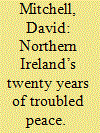

|
|
|
|
|
| Summary/Abstract |
“It remains an open question whether power-sharing can operate with sufficient mutual trust when the main parties have diametrically opposed aspirations for the future of the region.”
|
|
|
|
|
|
|
|
|
|
|
|
|
|
|
|